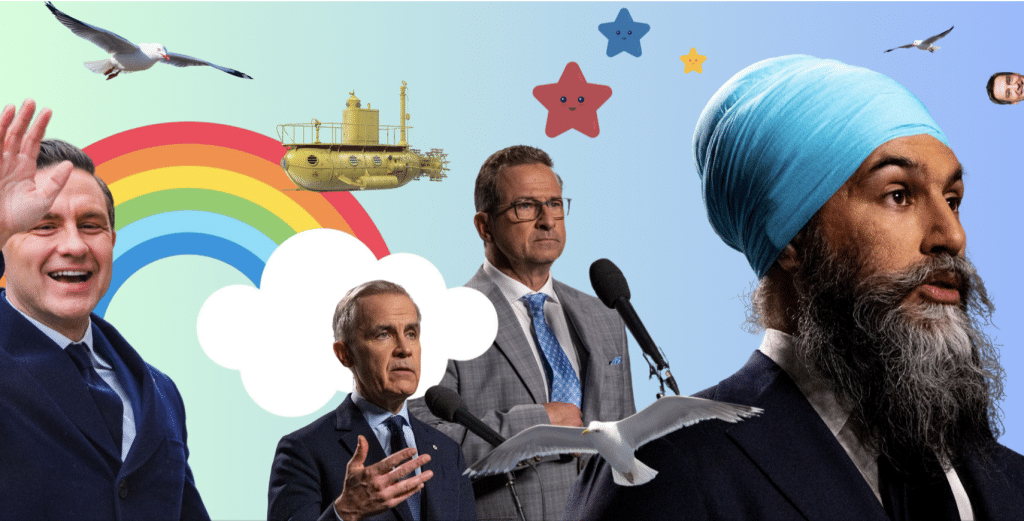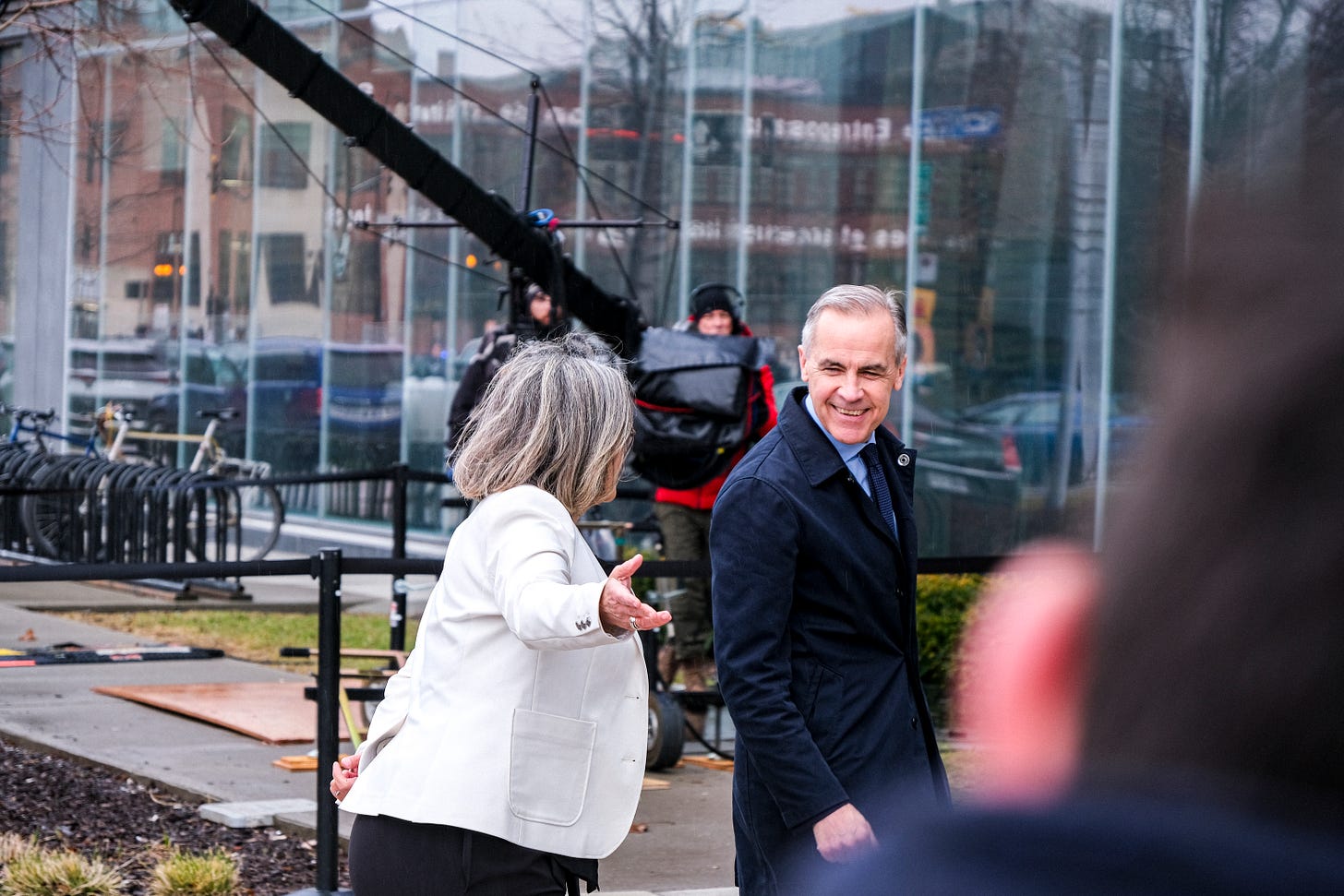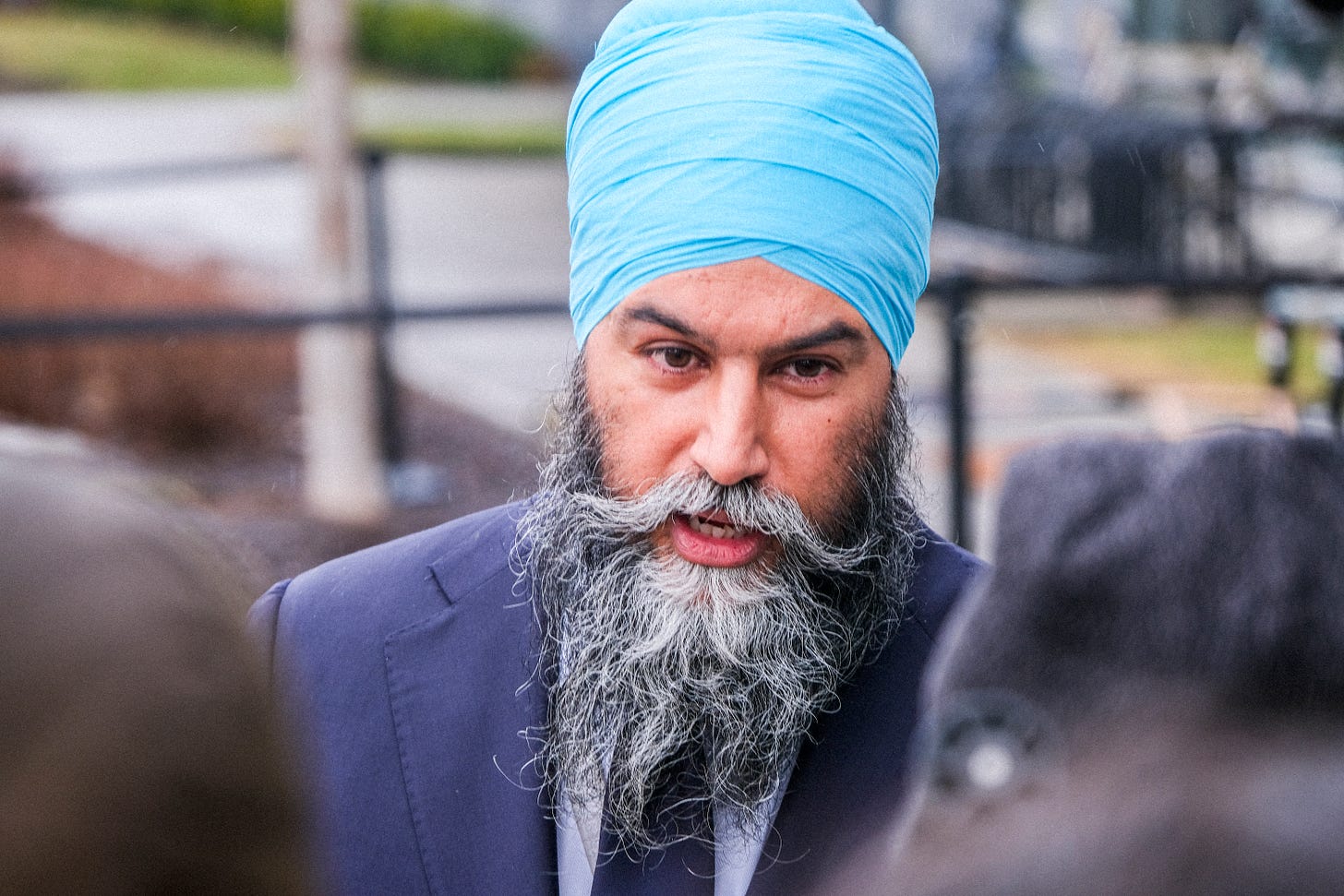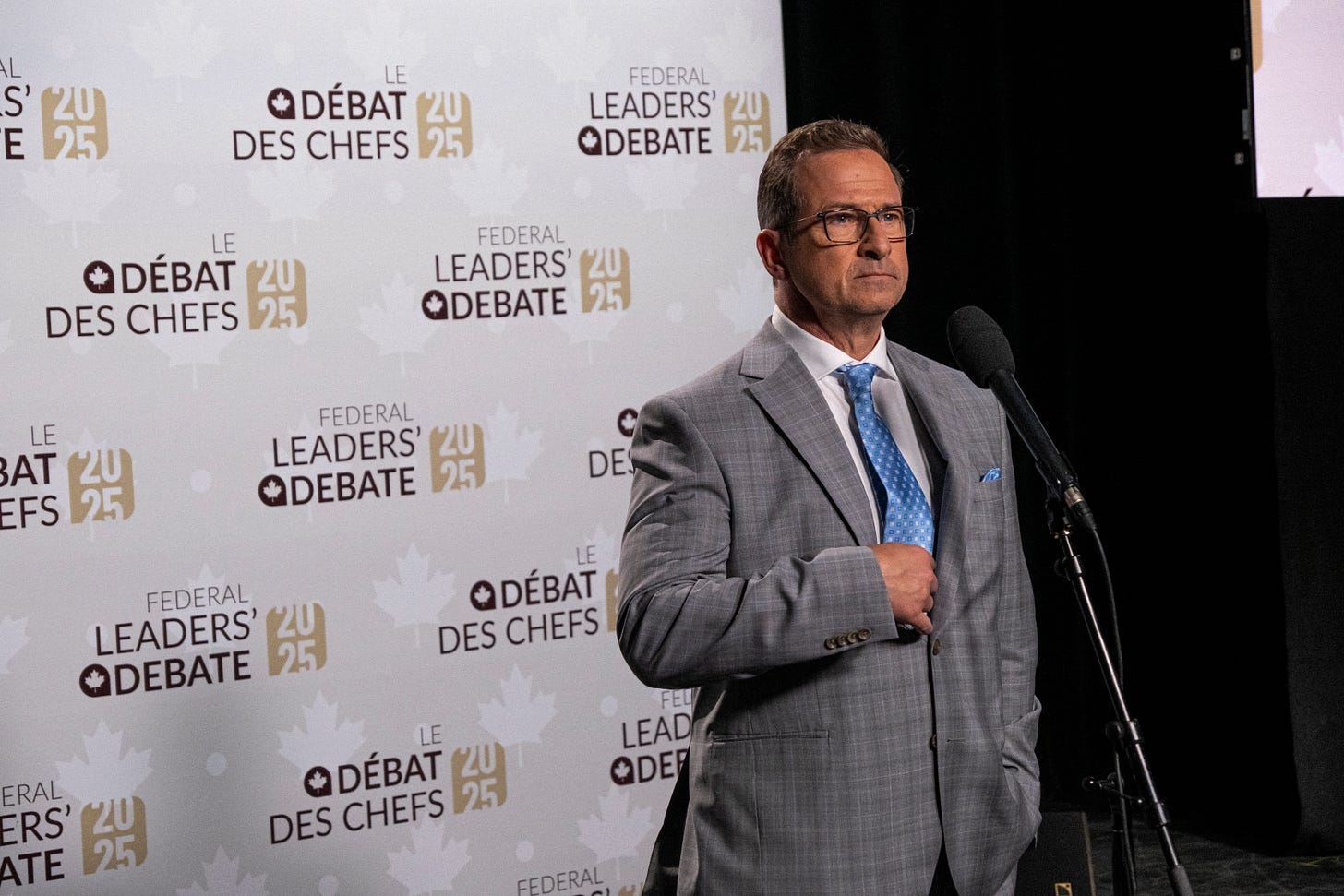Who won? Who lost? Who cares?
This is the same newsletter as was seen on https://therover.ca ! Isaac was a contributor, and so we wanted to share it. It is not translated and is identical to what the Rover did. We will have a bilingual coverage for you, from Isaac and Gabrielle tomorrow!
Il s'agit du même bulletin que celui publié sur https://therover.ca ! Isaac y a contribué, et nous souhaitions donc le partager. Il n'est pas traduit et est identique à celui du Rover. Nous vous proposerons un article bilingue, écrit par Isaac et Gabrielle, demain !
The Neoliberalism Election
By Christopher Curtis
Cutting taxes, cutting services, cutting regulations. If there’s one thing the two leading parties in this election agree on, it’s neoliberalism.
Conservative Leader Pierre Poilievre vowed to de-regulate the oil and gas industry throughout Wednesday’s debate, namely by abolishing Bill C-69. Adopted by the Trudeau Liberals in 2018, C-69 imposes considerations like environmental impact and Indigenous consultation before federal regulators award drilling or pipeline permits.
Poilievre claims the law is unconstitutional. The Tory Leader’s promise to accelerate energy development by setting up a “one stop shop” for consultation — combining all levels of government under one convenient roof. This feels like at least two violations of the Constitution. Section 35, for instance, guarantees that energy infrastructure projects affecting Indigenous territory require meaningful consultation. And the separation of powers allowing provinces to control their own natural resources has been enshrined into law since Confederation. Imagine the federal government crossing the Ottawa River and trying to “streamline” anything in Quebec? This is a bad idea, Pierre.
Poilievre repeated his proposal to cut taxes for working Canadians by 15 per cent, eliminate sales tax on new homes, reduce up to 17,000 federal government jobs and find $1 of cuts for every $1 of new expenses the government incurs. The leader’s tax cuts would cost $13 billion.
For his part, Liberal Leader Mark Carney said he would reduce the size of federal government by attrition — i.e. not replacing some of the 17,000 federal workers set to retire in the coming years. Carney wants to reduce taxes by $577 on families with an income of $90,000 or less. That would remove an estimated $5.9 billion from Ottawa’s coffers.
Carney also vowed, during Wednesday’s debate, to accelerate the regulatory process on major oil projects, which — as in Poilievre’s case — will run into complications. Given Section 35 of the Constitution but also the adoption, under Prime Minister Trudeau, of the United Nations Declaration of the Rights of Indigenous Peoples in 2021. That law imposes even more Indigenous consultation onto developers.
Housing
By Isaac Peltz
The four leaders presented different visions for housing– and none of them with any firm plans.
They seemed to have ideas that could be called “innovation” but without strong numbers, it’s hard to say how any of these things could be considered practical. One of the troubles with the language tonight was that the words “affordable” and “socialized” were interchangeable, and the leaders would use them as though they were the same. They are not, and the definition of affordable is left in the hands of a housing speculator (Poilievre), an investment banker (Carney) and a lawyer (Singh), three people that are not likely to have problems affording their houses. Overall, if you don’t read any further, the proposals around housing (especially, or specifically by the front runners) were a relative disappointment.
We’ll start with the two frontrunners — Poilievre’s ideas are, as far as I could tell, to privatize more and get rid of regulations around building. This would definitely accelerate development, but without any oversight we would see less housing that would be beneficial to live in. Most people who have rented understand the landlords who allow tenants to live in terrible conditions (illegal in Quebec, by the way,) and it is likely that with less regulation, there would be more situations like that. Not only this, but developers will match rental prices to the market. They have landlord unions who work together in order to unilaterally raise rental prices, and unless there are laws and strong regulations around the housing market, prices will simply go up. This is the future that Poilievre envisions.
Carney has an interesting housing plan, but it lacks details and seems to be a half step. The Liberals have consistently relied on Private Public Partnerships, which generally bring up costs significantly and prevent proper innovation due to minimal oversight. For example, the REM commuter train in Montreal came in at $9.4 billion. The original budget was $6 billion.
In 2023-2024 there were almost 300 major PPPs underway, and the costs were nearing $140 billion, and likely to grow. Canada has been relying on this method since the Chretien era, and it is one of the biggest reasons for slow housing being built and the fact that housing prices doubled under Harper, and then doubled again under Trudeau. PPPs have too much red tape for the efficiency of private development, but do not keep costs down like nationalized industry. It seems that Carney wants to create his new “canadian real estate developer,” which, as far as I can tell, is a PPP investment fund. If it is a real nationalized industry, this will not be a problem. But based on the Liberal track record, it will be a PPP.
Singh did not present a strong plan around housing, but instead presented a plan around having money for housing. He proposed much higher taxes on the rich, and a reduction of taxes on people who make less than $90,000. It seems that the NDP in power would propose for higher socialized housing, while funding it through taxation. The exact targets that he is expecting are murky.
Blanchet would like to create 100,000 new socialized housing projects in Quebec. He said he did not have a response to build up for the rest of the country, as he is not interested in running for Prime Minister, but he wants to have higher taxation, and a better control over Quebec’s industries to bring money back to the province. One question that was not fielded or pitched towards Blanchet was how he would contend with this same idea, given that the Coalition Avenir Québec is in power. The CAQ, although have shown a recent openness to housing, are against any sort of socialization or nationalization, and so Blanchet’s vision for Quebec seems to stand in stark contrast to the reality of the province.
The Green party, who was not at the debate tonight, wants to put laws in place around what “affordable” means, capping prices at 30% of the national median income. They also want to ban corporations from purchasing too many homes.
CLIMATE
By Emelia Fournier
Adding to what Chris wrote, the Liberal and Conservative leaders agreed on this key issue: Canada needs to increase its domestic oil and gas production to empower the country during the trade war with the U.S.
Poilievre and Carney want more pipelines built to ship Canadian oil and gas domestically and reach foreign markets. New Democrat Leader Jagmeet Singh dodged the question of whether they would like to maintain, increase or reduce oil and gas production, but stated that they would favour investment in renewable energy. Singh did remind the leaders that “the climate crisis is now” and that Canada should focus its efforts on expanding renewable energy sources.
He also said increasing investments in public transit is key to combating the climate crisis. Blanchet was the only leader to explicitly state that he wanted to progressively reduce oil and gas consumption in Canada, and does not want new pipelines built. Blanchet acknowledged that oil and gas are important to the Canadian economy, but emphasized that there are alternative energy resources available in Quebec. He also does not want any new pipelines built in the province, saying that the U.S. would not jeopardize its own economic interests by halting the import and export of oil across the Canadian border. Poilievre wants to accelerate the approval process and eliminate bureaucracy for resource extraction projects. As we stated earlier, this would include repealing Bill C-69, which imposes considerations like environmental impact and Indigenous consultation before federal regulators issue permits for resource extraction projects.
When asked if Indigenous refusal would prevent the construction of a project, Poilievre falsely claimed that only 20 per cent of affected First Nations opposed the Northern Gateway pipeline project, and did not explicitly say whether Indigenous consent would be required for resource development projects. Poilievre said he would not increase oil and gas subsidies, and new pipelines would be funded by private investment spurred by laxened regulations and faster project approvals. When questioned by Singh about whether the oil and gas industry would keep getting subsidies, Carney said “no.”
Carney said pipelines would not be approved without Indigenous consent. Carney and Poilievre are in favour of developing nuclear energy, Singh is not favourable to nuclear energy and would prefer to prioritize hydroelectricity. Blanchet did not weigh in, but the Bloc has opposed a major nuclear waste facility near Chalk River affecting First Nations in the region. During the question period, Blanchet said “How is it possible that in the context of negotiation with the United States, no one said ‘Where’s the seat for First Nations at the table?’ while they could be valuable allies in this commercial war with the United States.”
While the Greens were not at the debate tonight, they’ve pledged to cut emissions by 60 per cent by 2030 and committed to net zero carbon emissions by 2050. Pendeault said they want to increase lithium mining in Canada and the domestic production of electric vehicles to increase trade with countries other than the U.S. The Greens also aim to halt all new fossil fuel projects by 2045 and end oil and gas subsidies.
Trailers and due process
R. Pratka
Over one in five Canadian citizens was born abroad. Except for those who have become naturalized citizens – a category of which I very recently became a part – immigrants don’t get a vote. And yet, unsurprisingly, immigration and asylum took up a lot of space in the French leaders’ debate on April 16, as Liberal Leader Mark Carney, Conservative Leader Pierre Poilievre and Bloc Québécois Leader Yves-François Blanchet each took their turn to say that Quebec’s public services were approaching their breaking point due to immigration.
Moderator Patrice Roy raised the possibility of an influx of Haitian asylum seekers from the United States, lining up at border checkpoints or disappearing into the cross-border wilderness and reappearing to claim asylum.
“People need to immigrate by normal pathways,” said Conservative Leader Pierre Poilievre. “These are human beings we’re talking about here, among the most vulnerable people in North America, but there are limits,” Liberal Leader Mark Carney said. “We need to be humane, but realistic. We have the [Canada-US] Safe Third Country Agreement, which allows us to send back most asylum seekers [to the U.S.].”
Seeking asylum is legal. The Universal Declaration of Human Rights, to which Canada is a signatory, states that people have the right to seek freedom from persecution or conflict by requesting asylum in another country. Asylum seekers in Canada are entitled to a hearing to determine whether their claim is legitimate. The system is imperfect, leaving people in limbo for years waiting for a hearing date, retraumatizing people who have experienced violence, assuming a claim is false until proven otherwise (the reverse of “innocent until proven guilty”) and placing life-and-death decisions in the hands of a single judge, but it provides a semblance of due process. Remember that?
Under international law, a person who seeks asylum can’t be sent back to their country of origin if that country is unsafe due to the possibility of torture or human rights violations. This is known as the non-refoulement principle. The Safe Third Country Agreement, passed in 2002, is predicated on the fact that both the US and Canada are safe from such violations, so an asylum seeker can be sent back to either country without violating the principle, and without a hearing. The closure of Roxham Road tightened a loophole that allowed people who walked into Canada without passing through checkpoints to apply for asylum and get a hearing, so most of those people are now simply sent back to a country that is no longer even pretending to care about due process.
All four leaders said people experiencing persecution at home should be able to start their lives over again in this country, although Poilievre raised the spectre of “fake asylum seekers.” Again, assuming that large numbers of people are faking stories of persecution is problematic, but how can we even start determining who is telling the truth if we expel them without the minimal due process a hearing affords?
In another notable exchange, Bloc Québécois leader Yves-François Blanchet said Canada needed to “slow down the rhythm” of irregular arrivals. How does one slow down the rhythm of people seeking persecution – setting up mobile classrooms on the border and telling people to sit tight?







